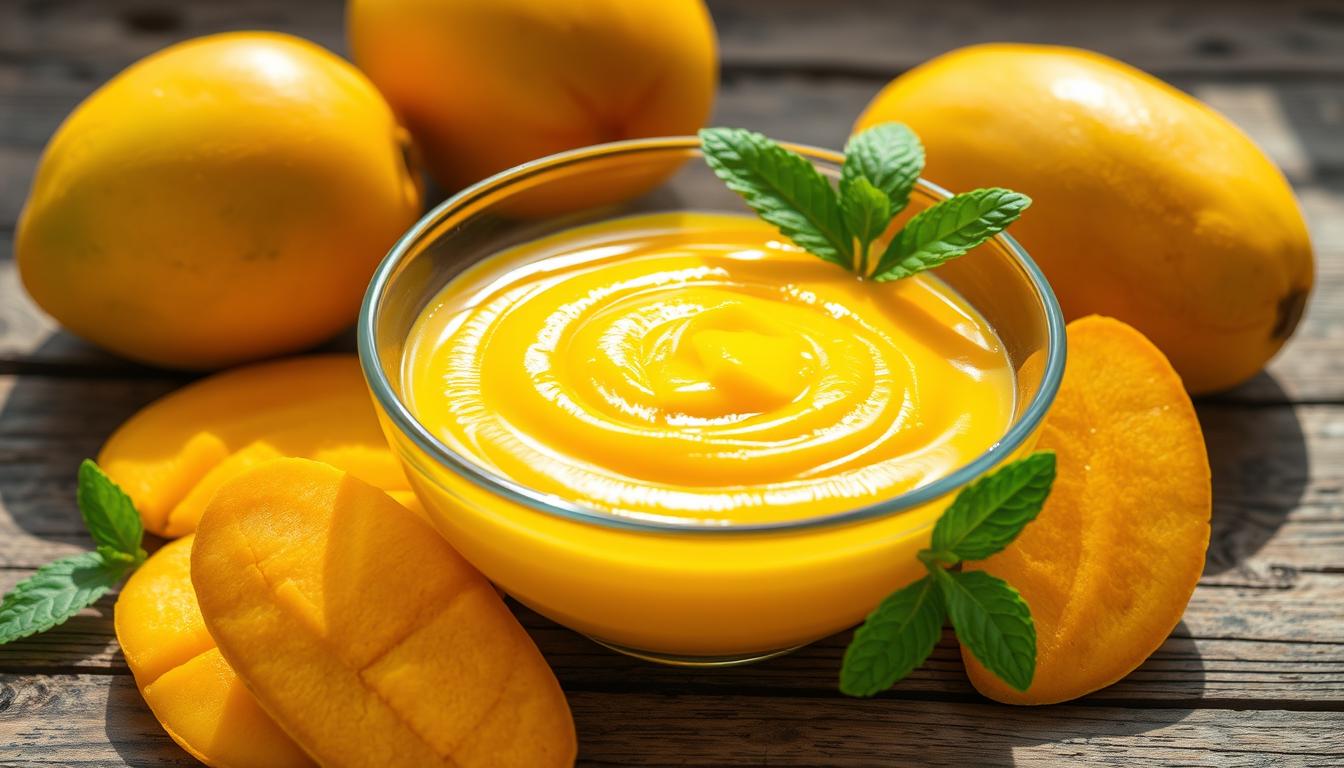The sweet smell of ripe mangoes takes me back to my childhood summers. My grandma would make her famous mango smoothies. Those creamy, vibrant drinks were the best part of my day, a refreshing taste of the tropics.
Now, as an adult, I miss that flavor. Making my own mango puree has brought back those memories. It’s easy to make and opens up a world of flavors, from desserts to drinks.
In this guide, you’ll learn to make your own puree. You’ll need fresh, ripe mangoes and a few basic tools. This recipe is perfect for adding a tropical twist to your cooking or enjoying summer’s taste all year.
Table of Contents
Introduction to Mango Puree: A Tropical Delight
This recipe is a tasty mix of blended, ripe mangoes. Making it at home gives you better taste and health benefits than store-bought. It’s perfect to make when mangoes are in season or if you have too many ripe ones.
Benefits of Homemade Mango Puree
Making your own mango puree lets you pick the freshest ingredients. It tastes more vibrant and real than store-bought. Plus, you skip the preservatives and additives found in commercial products.
When to Make Mango Puree
The best time to make Blended mango is when mangoes are at their peak. This usually happens in the summer, depending on where you live. Enjoying mango puree during this time lets you taste the fruit’s full sweetness all year.
Uses in Cooking and Beverages
Mango smoothie base is great for many recipes. Add it to smoothies, shakes, and juices for a tropical twist. It’s also amazing in desserts like ice cream, sorbet, and popsicles. Plus, it can sweeten up marinades, sauces, and savory dishes.
“Mango puree is a true taste of the tropics, adding sweetness and freshness to both sweet and savory dishes.”
Looking to make a mango-themed drink, dessert, or just enjoy pure mango flavor? Homemade mango puree is a versatile ingredient that will make your dishes stand out.
Essential Ingredients and Equipment
To make delicious homemade mango puree, you need a few key ingredients and tools. First, you’ll need ripe, sweet mangoes. The best types are Alphonso or Ataulfo mangoes. They are soft and blend well.
You might also want lemon juice. It complements the sweetness with a hint of tanginess.
For blending, a strong blender or food processor is essential. It should make the puree smooth and creamy. For an even smoother texture, use a fine-mesh sieve to strain it after blending.
| Ingredients | Equipment |
|---|---|
|
|
With these mango puree ingredients and equipment, you’re ready to make a tasty treat.Add it to smoothies, desserts, or use it as a topping. This fresh Mango mash will surely please your taste buds.
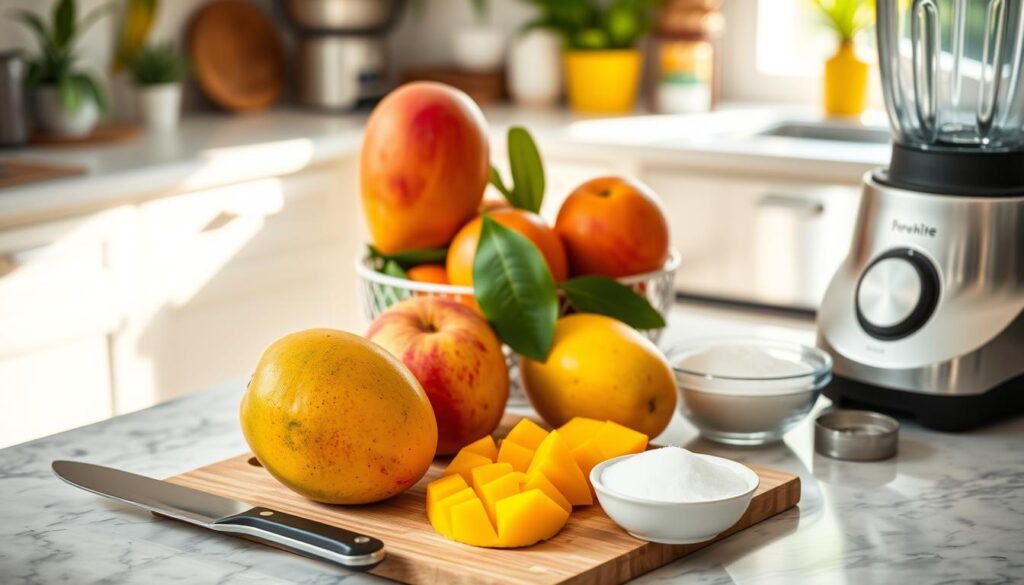
How to Choose the Perfect Mangoes for Puree
Choosing the right mangoes is key for a great mango puree. Select mangoes that are ripe but still firm, yielding slightly when you press them gently. Good options include Alphonso, Ataulfo, Kent, and Tommy Atkins mangoes.
Popular Mango Varieties for Puree
- Alphonso mangoes are known for their deep orange color, smooth texture, and intense sweetness.
- Ataulfo mangoes, also called “Champagne” mangoes, have a golden-yellow skin and a soft, butter-like consistency.
- Kent mangoes are large, oval-shaped, and have a sweet, juicy flesh with minimal fibers.
- Tommy Atkins mangoes are the most commonly found in the United States, with a mild flavor and slightly fibrous texture.
Ripeness Indicators
Check the ripeness of mangoes by their feel and smell. Ripe mangoes are slightly soft and smell sweet. The skin might show some yellow, but avoid soft or blemished mangoes.
Storage Tips
Store unripe mangoes at room temperature to ripen them. Once ripe, keep them in the fridge for up to 5 days. Leftover puree can be stored in the fridge for 4 days or frozen for 6 months.
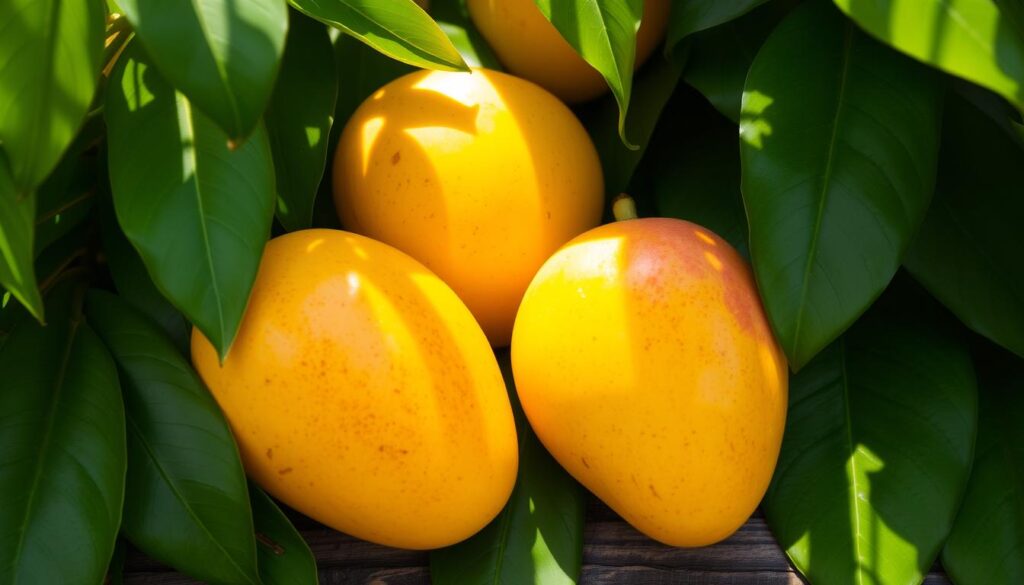
Preparing Mangoes for Processing
Getting mangoes ready for puree is a simple but important step. First, wash the mangoes well to get rid of dirt and contaminants. Next, use a sharp knife or vegetable peeler to carefully remove the skin. This is key because the skin can make the puree taste bitter.
Next, Cut the mango flesh away from the pit. Be careful with green mangoes as their sap can irritate your skin. After separating the flesh, chop it into smaller pieces for blending. If you’re using frozen mangoes, thaw them first before making the puree.
- Thoroughly wash the mangoes under running water.
- Peel the skin using a sharp vegetable peeler or knife.
- Cut the mango flesh away from the pit.
- Roughly chop the mango pieces to prepare for blending.
- Thaw frozen mangoes completely before processing.
By following these steps, your mangoes will be ready for puree-making. This will help you make a tasty and refreshing mango puree at home.
| Equipment | Capacity |
|---|---|
| Industrial mango cutting machines | Can cut up to 800 mangoes per hour |
| Mango peeling machines | Specifically designed for peeling mangoes in bulk operations |
| Automatic mango cutting machine | Equipped with sensors to detect size and shape for precise cuts |
Using industrial-grade equipment can make preparing mangoes faster, even for large amounts. These machines are made to efficiently wash, peel, and cut mangoes. This reduces both time and labor costs.
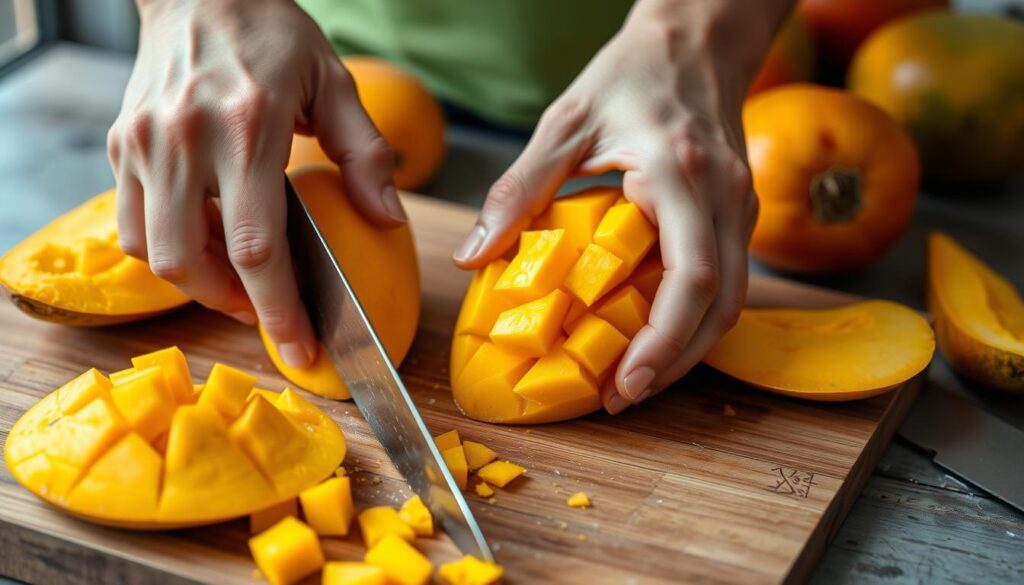
“Proper preparation is the key to unlocking the full flavor and richness of Mango nectar.”
Step-by-Step Mango Puree Recipe
Enjoy the taste of summer with a homemade puree recipe. It’s full of tropical flavor. This guide will show you how to make a silky smooth mango puree at home.
Basic Preparation Method
First, pick ripe, juicy mangoes. Peel, remove the pit, and cut them into small pieces. Put the mango chunks in a blender with a little water to start blending.
Blend on high until smooth and creamy, adding more water as needed to achieve the desired consistency.
Blending Techniques
- Blend in batches to avoid overcrowding the blender and ensure a consistent texture.
- For an extra-smooth puree, consider straining the blended mango mixture through a fine-mesh sieve.
- Optional additions like a squeeze of lemon juice can add a touch of tartness, while a drizzle of honey can enhance the natural sweetness.
Straining Options
If you want a silky-smooth mango puree, strain it through a fine-mesh sieve or cheesecloth. This removes fibrous or pulpy bits. You’ll get a velvety-smooth puree perfect for many dishes.
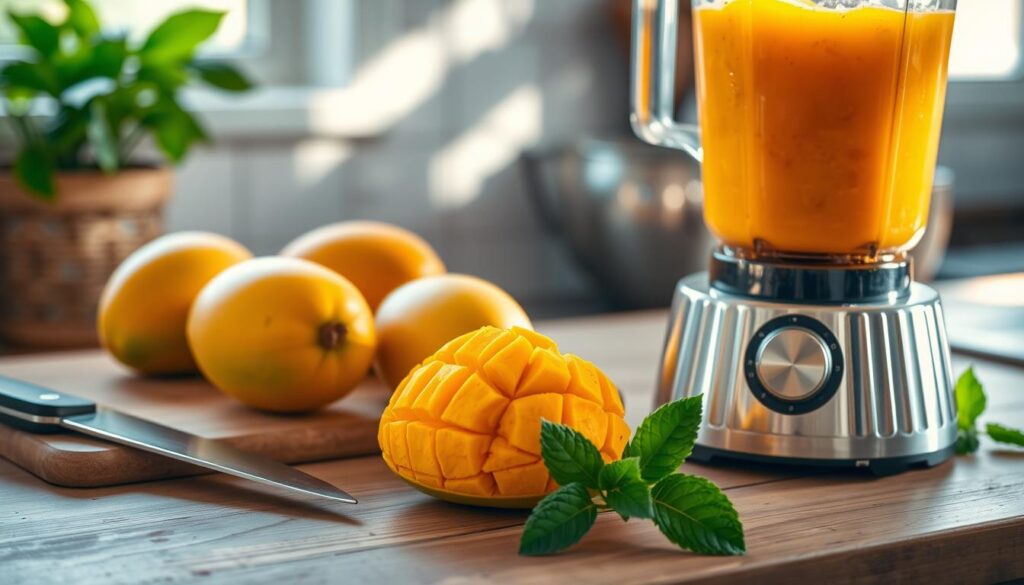
“The Mango blend should yield around 1 cup of puree after blending two medium-sized mangoes.”
This easy mango puree recipe adds tropical flavor to your favorite dishes. Use it in smoothies, cocktails, sauces, and desserts. Enjoy the versatility of this homemade ingredient and taste summer all year.
Storage and Preservation Methods
Keeping homemade mango puree fresh and flavorful is key. The right storage methods can help keep your puree good for longer. This way, you can enjoy it in many ways.
Refrigerator Storage
You can store fresh mango puree in the fridge for 2-3 days. Store it in an airtight container to maintain freshness. This helps keep the puree’s bright color and taste.
Freezing Mango Puree
Freezing is great for longer storage. Pour the puree into ice cube trays or containers safe for the freezer. It can be stored in the freezer for up to 6 months. Just thaw it in the fridge before using it in your recipes.
| Storage Method | Shelf Life |
|---|---|
| Refrigerator (Airtight Container) | 2-3 days |
| Freezer (Puree in Cubes or Containers) | Up to 6 months |
Note: Canning mango puree is not recommended due to safety concerns. The high acidity of ripe mangoes can lead to health risks if the canning process is not done meticulously.
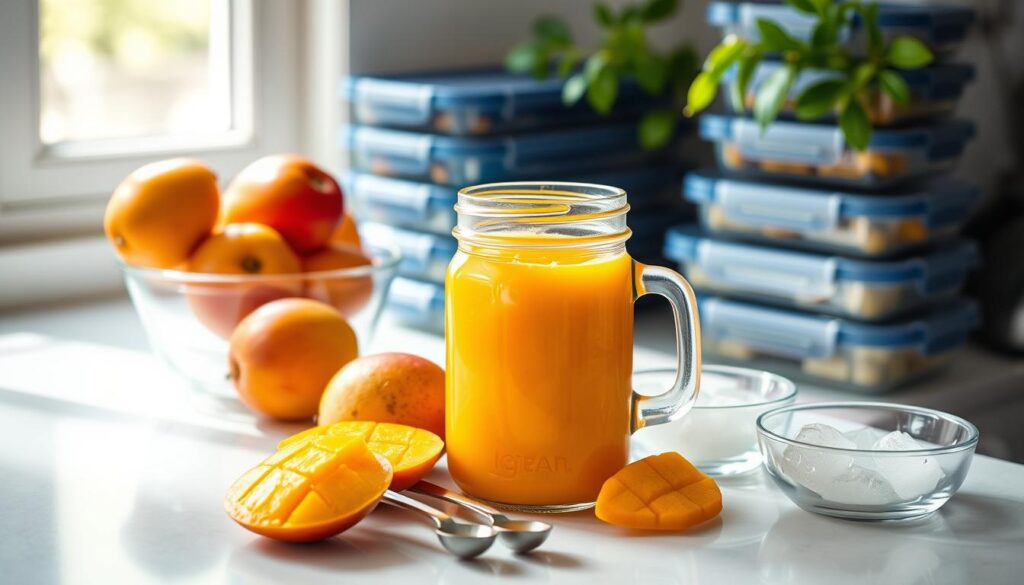
Storing and preserving your mango puree right is important. By refrigerating or freezing it, you can enjoy summer’s taste all year.
Creative Ways to Use Mango Puree
This recipe is a versatile ingredient that can make many dishes and drinks better. It can turn simple desserts into something special or add a refreshing twist to drinks. The possibilities are endless with this tropical treat.
Dessert Applications
It is great in sweet treats, adding a burst of fruity flavor and color. Mix it into creamy mango puree recipes like mousse or ice cream. Alternatively, use it as a topping for cheesecakes and tarts.
It can also be the main ingredient in muffins, cakes, and other baked goods. This adds a delightful tropical twist to your baked goods.
Beverage Ideas
For a refreshing drink, blend mango into smoothies, lassis, and cocktails. Its natural sweetness pairs well with yogurt, milk, or plant-based alternatives. This creates a creamy, indulgent drinks.
You can also freeze it into popsicles or ice cubes. This makes for a cool and refreshing treat on a hot day.
Culinary Uses
Pureed mango is not just for sweet dishes; it’s also great in savory ones. Use it in marinades, dressings, and sauces for a touch of sweetness and acidity. Mango puree recipes can be the base for curries or a flavorful addition to roasted vegetables and grains.
Whether you’re making a decadent dessert, a refreshing drink, or adding a tropical twist to savory dishes, mango puree can elevate your cooking. It’s a versatile ingredient that can take your culinary skills to new heights.
Troubleshooting Common Issues
Making the perfect mango puree at home is fun, but sometimes you might hit a snag. Don’t worry, we’ve got the fixes for the most common mango puree issues.
Adjusting Consistency
If your mango puree is too thick, just add a bit of water or fruit juice. This will make it thinner. On the other hand, if it’s too thin, blend in more mango or simmer it to reduce the liquid.
Addressing Graininess
Sometimes, mango puree can feel grainy. To fix this, strain it through a fine-mesh sieve. This will get rid of any lumpy bits and leave you with a smooth puree.
Balancing Tartness
If your mango puree is too tart, you can sweeten it. Use honey or agave nectar to do this. Start with a little and adjust until it tastes just right to you.
| Common Mango Puree Problems | Solutions |
|---|---|
| Puree is too thick | Add small amounts of water or juice to thin it out |
| Puree is too thin | Blend in more mango flesh or simmer to reduce excess liquid |
| Puree is grainy | Strain through a fine-mesh sieve |
| Puree is too tart | Add a natural sweetener like honey or agave nectar |
By fixing these common mango puree issues, you’ll make a smooth, tasty puree. This will take your cooking to the next level.
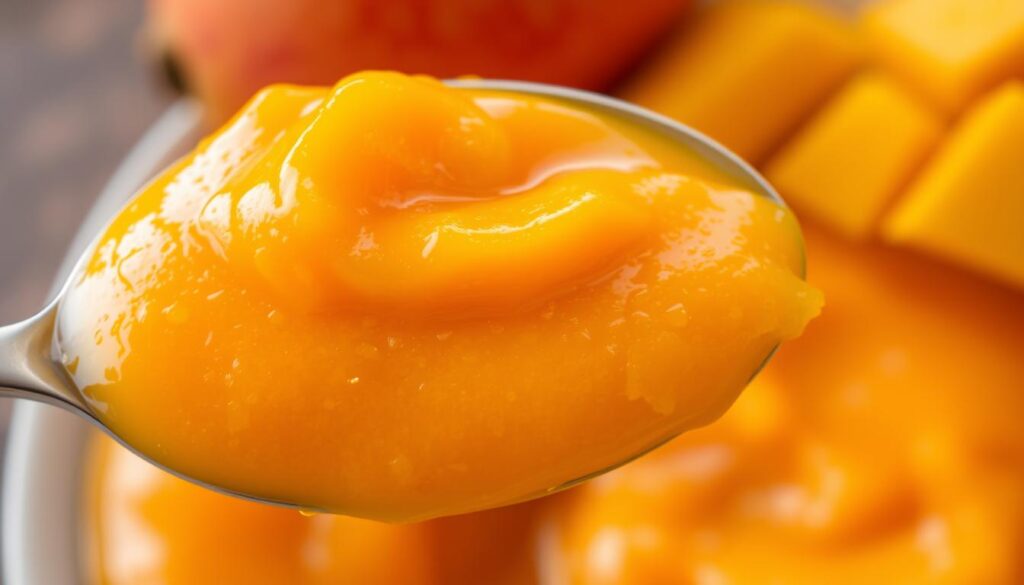
Health Benefits and Nutritional Information
Mango puree is a nutritious treat that’s full of health benefits. It’s packed with vitamins A and C, which boost your immune system and skin health. It also has dietary fiber, helping with digestion and weight management.
One cup of mango puree has about 100-150 calories, depending on the type and how it’s made. Mango is sweet, but eating it in small amounts is okay. It’s a tasty, healthy choice instead of sugary snacks.
| Nutrient | Amount per Cup | % Daily Value |
|---|---|---|
| Calories | 100-150 | – |
| Vitamin A | 25% RDI | 25% |
| Vitamin C | 100% RDI | 100% |
| Dietary Fiber | 3g | 12% |
Mango puree also has plant compounds that are good for you. Adding it to your diet can improve your health and taste. It’s a delicious way to boost your nutrient intake.
“Mango puree is a nutrient-dense superfood that can be a valuable addition to a balanced diet. Its unique blend of vitamins, minerals, and antioxidants make it a fantastic choice for supporting various aspects of health.”
Tips for Perfect Mango Puree Every Time
Making a delicious mango puree at home is simpler than you might think. Follow these mango puree tips for a smooth and tasty result every time.
Start by picking ripe, sweet mangoes for the best taste. The fruit’s natural sweetness and bright color will make your puree stand out. Adjust the thickness by adding water or reducing it if needed. This ensures the perfect mango puree consistency for your use.
Try chilling the puree before serving for a refreshing twist. It can make your puree even more flavorful. Also, try different mango varieties to find your favorite taste.
Remember, adding a pinch of salt can make your puree even better. It balances the sweetness of the mangoes.
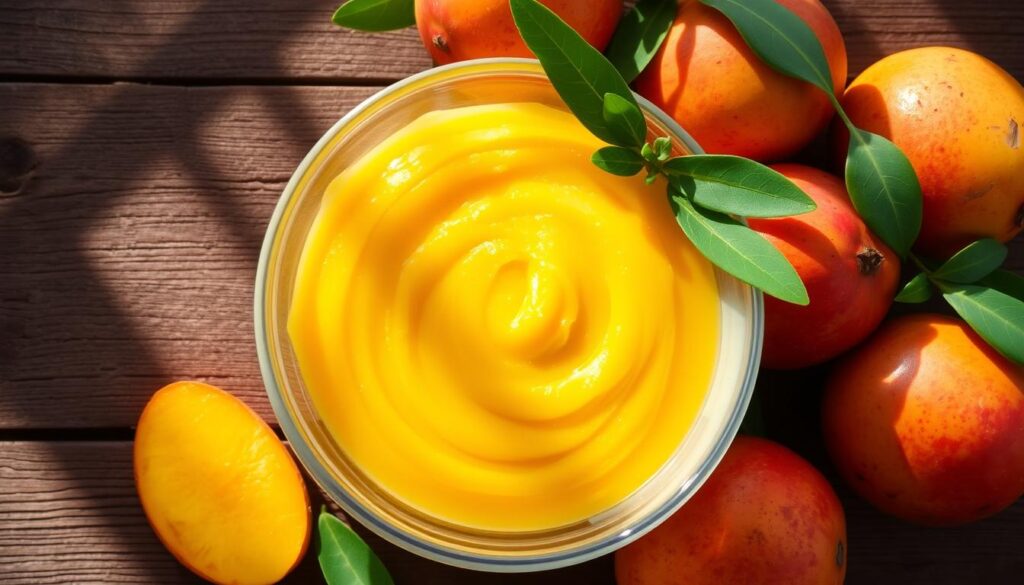
“The key to creating the perfect mango puree is selecting high-quality mangoes and paying close attention to every step of the preparation.”
Conclusion
Making fresh mango puree at home is easy and rewarding. It gives you a versatile ingredient for many dishes. By following this guide, you can make delicious, preservative-free mango puree. It tastes better and is healthier than store-bought.
This homemade recipe benefits include fresh, quality mangoes. You also get to control the ingredients and customize the taste and texture. This makes your puree unique.
It is very versatile. You can use it in many recipes, from desserts to drinks. Try making a creamy mango smoothie, a moist mango cake, or adding it to savory dishes. The fresh mango puree advantages are endless.
FAQ
What is mango puree?
What are the benefits of homemade mango puree?
When is the best time to make mango puree?
How can I use mango puree in cooking and beverages?
What kind of mangoes are best for making puree?
How do I know when a mango is ripe enough for puree?
What equipment do I need to make mango puree?
How do I prepare the mangoes for making puree?
How long can I store homemade mango puree?
What are some common issues with mango puree and how can I fix them?
Source Links
- How to Make Mango Juice at Home (Easy Recipe)
- Preserving Fruits: Mangoes (SP 50-1006)
- Kitchen Archives – Under the Mango Tree
- Tropical Mango Chia Pudding Recipe | LynneCurry
- Spicy Mango Margarita Recipe: Sweet & Fiery Delight
- Moist Mango Pound Cake Recipe | ChefDeHome.com
- Aseptic Fruit Purees | Fresh Fruit Ingredient For Natural Beverages
- Mangoes & Thanksgiving Advice – Under the Mango Tree
- Unlocking the Tropical Flavor: Creative Ways to Cook with Mangoes
- Mango Mousse (Creamy 3 Ingredient Recipe)
- Mango Processing Solution Provider | From AtoZ
- Blog | Mango Processing Solution Provider
- A Guide to Shelf Life of Fruit Purees
- Advances in antimicrobial techniques to reduce postharvest loss of fresh fruit by microbial reduction – npj Sustainable Agriculture
- The Best Ways to Use Mango in Home Cooking
- What to Make with Mangoes: 24 Delicious Mango Recipes You’ll Love – The Crafty Chefs
- Mango Lassi Recipe (With Fresh Mangoes)
- Make The Best Mashed Potatoes Recipe Every Time
- Easy Mango Gummies Recipe: A Step-by-Step Guide for Perfect Homemade Treats
- 10 Benefits of Eating Mango at Night – eachnight
- How to choose the best fruit purée for your artisan ice cream? – Andros Chef, professional fruit ingredients
- Vegan Mango Pudding Recipe with Agar-Agar | Easy & Delicious Tropical Dessert
- Glutathione and Ascorbic Acid Accumulation in Mango Pulp Under Enhanced UV-B Based on Transcriptome
- Physio-chemical analysis and antioxidative response of Ag NPs synthesized by sufaid chonsa mango pulp extracts of different ripening stages – Scientific Reports
